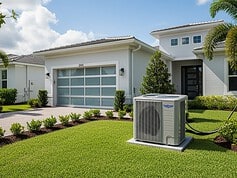
There are various solutions available for many homes, and many people may automatically buy an air conditioner when they begin to feel the summer heat. This is to be expected because they’re familiar and they can be available in many stores.
However, there are other cost-effective alternatives that provide better versatility out there. The truth is that many homeowners don’t realize that heat pumps from Nova Heat Pumps can offer them both heated and cooled air in one appliance, and this can make a huge difference in both cost and comfort.
Some may think that an AC is a one-season investment, and this can only be used during the hot summer months. However, when the cold returns, they may rely on separate systems like furnaces to heat their home during the wintry months.
It’s a dual-approach where others will need to install several appliances and connect lots of pipes in the process. It can lead to inefficiencies over time, and this is where a heat pump comes in. It does the work of two systems while saving you money on your electrical bills each month.
Still, there’s confusion surrounding them, and this is often understandable. On the surface, an AC and a heat pump may be similar in appearance. Many think that they look alike, and they connect to the same ducts. However, their underlying technology is different, and the performance that the two offer is drastically different from each other. Understanding the distinctions between them is going to help you make smarter investment choices for your home.
The Cost of Relying on a Traditional Air Conditioner Alone
Using the standard appliance can mean that you’re only addressing the cooling needs of your home with a single appliance. It can cool efficiently, but once summer ends, the system can go dormant for months. You will have to switch to a different furnace system to warm up your home, and you might be juggling with different fuels and multiple thermostats, which can result in added costs.
Also, the traditional ACs are often not designed to be energy-efficient because their job is to simply pull the heat out of your house. However, since they aren’t able to reverse the process, you can’t expect them to heat up during the cold months. This is a limitation that might not seem like a big deal but know that your heating costs can climb when winter arrives. Find out more about an AC when you go to this page.
There’s the issue of maintenance as well because you will have to clean two separate systems or deal with more repairs due to the potential issues that they may encounter. More parts are going to wear down, and over time, even a reliable unit can become more expensive than it first appears, especially when paired with a separate heating system.
Why Does a Heat Pump Offer a Smarter Alternative?
This appliance works on the same basic principle as ACs, where they move the heat from one place to another. However, there’s a huge difference because they have features that make the process reversible. In the summer, they can operate like a typical air conditioner, but when the temperatures turn cold, they can reverse it and bring heat inside, making them an all-in-one system.
Since the heat is moved rather than created, these HVAC alternatives are going to use less energy compared to traditional oil furnaces. What this does is to lower your monthly bills and decrease your overall carbon footprint. In some cases, the utility companies may even offer rebates to encourage homeowners to switch to this technology.
Also, the temperatures are steadier, and you can find them to be low-maintenance. There are fewer components that you need to deal with when something goes wrong, and modern systems are built for long-term performance.
Things to Consider When Making the Switch

When you’re thinking about switching to a new system, you need to consider several factors. Find out more about your climate and see if your region has enough heat for you to install geothermal pumps. The modern appliances have come a long way, though, so you can expect that they can also perform even if they’re located in a cold region. Just make sure that the model that you’ve chosen was designed to handle the winter lows.
Do a thorough evaluation of your current setup and know that having ductwork in place can make installation much simpler. You can also opt for a ductless system that you can find out more here: https://www.energystar.gov/products/ductless_heating_cooling or a ducted one can be installed by the right professionals, depending on your needs.
Your budget is another thing to consider, but make sure that you’re not only seeing the upfront costs. While these pumps may require a higher initial investment than the standard ACs, they can pay for themselves through reduced energy bills over time. With fewer maintenance needs plus rebates, you can get a clearer picture that they’re more affordable down the road.
Why Now Is the Right Time to Upgrade?
Since the electricity costs are rising, you need to have a cost-effective alternative for your home. A switch to an eco-friendlier solution can also have a positive long-term impact on Mother Earth, and a heat pump can give homeowners the flexibility to stay comfortable regardless of the season. This is possible without the hassle of managing separate systems.
With modern smart technologies, some brands are now becoming more powerful and user-friendly. They’re built to operate in extreme temperatures, and many units are able to operate quietly. Smart thermostat integration is also becoming common, giving many owners more control of their indoor climate. Save money by simplifying your life with a single heat pump while upgrading your home’s comfort.
If you’re still relying on a traditional air conditioner with a separate furnace, you might want to rethink your setup today. The heat pump is going to future-proof your home, and you can connect with the experts to find the right system that’s tailored to your family’s needs.







